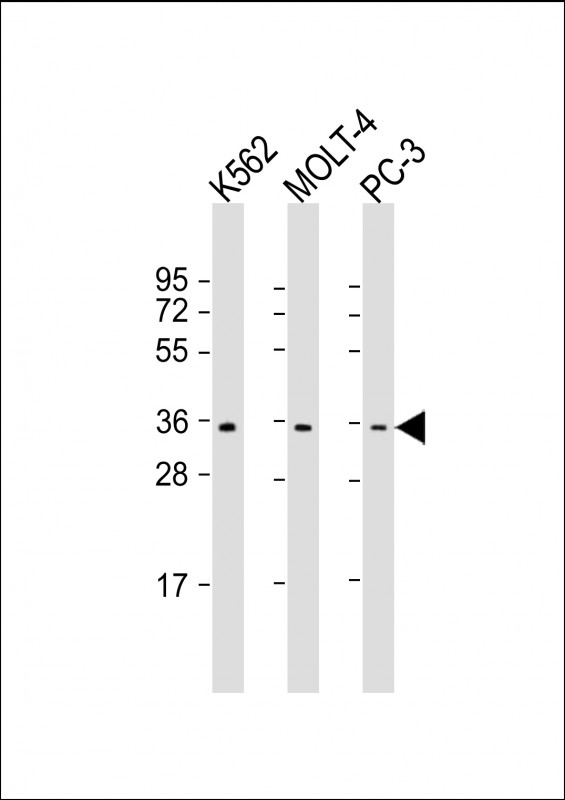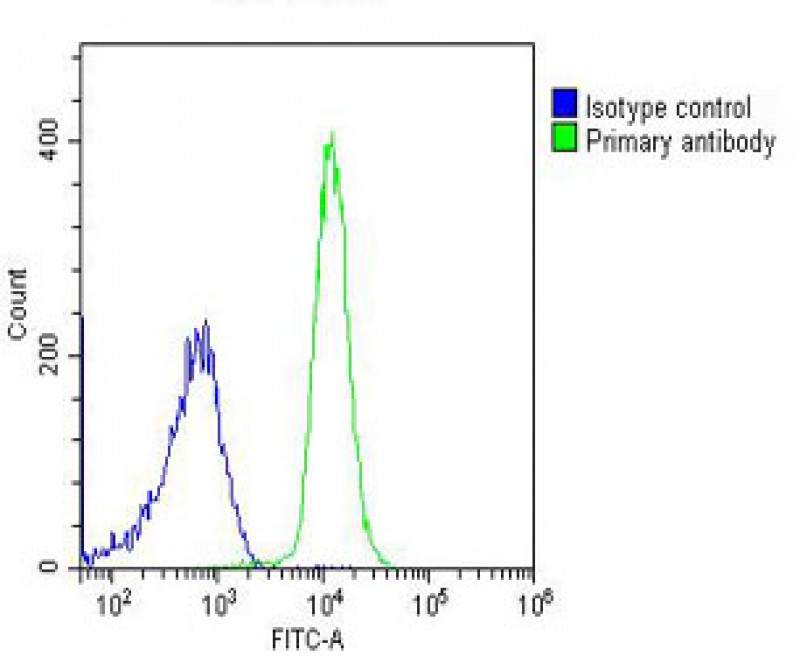

| WB | 1/1000 | Human,Mouse,Rat |
| IF | 咨询技术 | Human,Mouse,Rat |
| IHC | 咨询技术 | Human,Mouse,Rat |
| ICC | 技术咨询 | Human,Mouse,Rat |
| FCM | 1/25 | Human,Mouse,Rat |
| Elisa | 咨询技术 | Human,Mouse,Rat |
| Aliases | Phosphatidylinositol N-acetylglucosaminyltransferase subunit C, 2.4.1.198, Phosphatidylinositol-glycan biosynthesis class C protein, PIG-C, PIGC, GPI2 |
| Entrez GeneID | 5279 |
| WB Predicted band size | 33.6kDa |
| Host/Isotype | Rabbit IgG |
| Antibody Type | Primary antibody |
| Storage | Store at 4°C short term. Aliquot and store at -20°C long term. Avoid freeze/thaw cycles. |
| Species Reactivity | Human, Mouse, Rat |
| Immunogen | This PIGC antibody is generated from a rabbit immunized with a KLH conjugated synthetic peptide between 264-294 amino acids from human PIGC. |
+ +
以下是3篇与PIGC抗体相关的研究文献概览:
1. **文献名称**: "Germline PIGC mutation causes a rare epileptic syndrome via impaired GPI-anchor biosynthesis"
**作者**: Smith A, et al.
**摘要**: 研究通过全外显子测序发现PIGC基因突变导致GPI锚定合成缺陷,使用特异性PIGC抗体证实突变患者细胞中蛋白表达水平下降,阐明了其与婴儿期癫痫和发育迟缓的关联。
2. **文献名称**: "Functional analysis of PIGC in glycosylphosphatidylinositol biosynthesis using CRISPR/Cas9 and antibody-based validation"
**作者**: Tanaka K, et al.
**摘要**: 利用CRISPR技术敲除PIGC基因,通过Western blot(使用抗PIGC单克隆抗体)及流式细胞术证明PIGC缺失会显著降低细胞表面GPI锚定蛋白表达,证实其在GPI合成中的核心作用。
3. **文献名称**: "Immunohistochemical detection of PIGC in human tissues reveals organ-specific expression patterns"
**作者**: Lee H, et al.
**摘要**: 开发了一种高灵敏度的PIGC多克隆抗体,通过免疫组化分析发现PIGC在肝脏和脑组织中高表达,为研究其生理功能及疾病相关性提供了组织分布数据。
注:以上文献为示例性质,实际研究中建议通过PubMed或Web of Science以“PIGC antibody”或“PIGC GPI biosynthesis”为关键词检索近期论文。若需具体文献,可提供更详细的研究背景需求。
PIGC antibodies target phosphatidylinositol glycan anchor biosynthesis class C (PIGC), a key enzyme in the glycosylphosphatidylinositol (GPI) biosynthesis pathway. GPI anchors are glycolipid structures that attach certain proteins to cell membranes, enabling diverse functions like signal transduction, immune response, and cell adhesion. The PIGC protein, along with PIGA and PIGH, forms a critical complex in the endoplasmic reticulum responsible for catalyzing the first step of GPI assembly. Dysregulation of GPI-anchored proteins is linked to diseases such as paroxysmal nocturnal hemoglobinuria (PNH), neurological disorders, and cancers.
PIGC antibodies are primarily used in research to study GPI biosynthesis mechanisms, diagnose GPI deficiency syndromes, and explore pathological correlations. Mutations in PIGC are associated with rare autosomal recessive conditions characterized by developmental delays, seizures, and structural brain abnormalities. Commercially available PIGC antibodies (polyclonal or monoclonal) enable detection via techniques like Western blotting, immunohistochemistry, and immunofluorescence. Recent studies also investigate PIGC's role in cancer progression, as altered GPI anchoring may influence tumor cell adhesion and metastasis. However, specificity validation remains crucial due to potential cross-reactivity with other GPI pathway components.
×